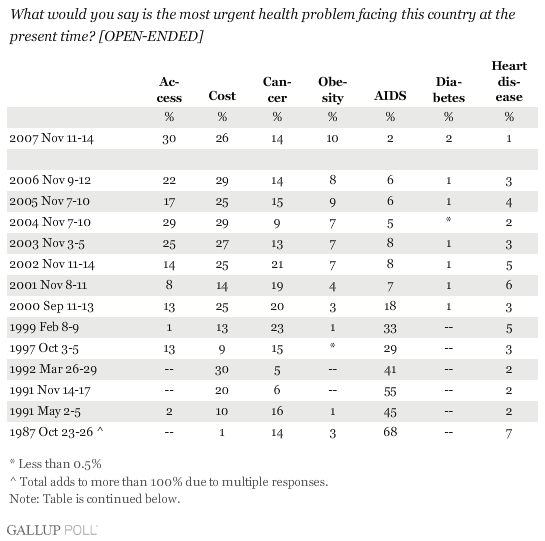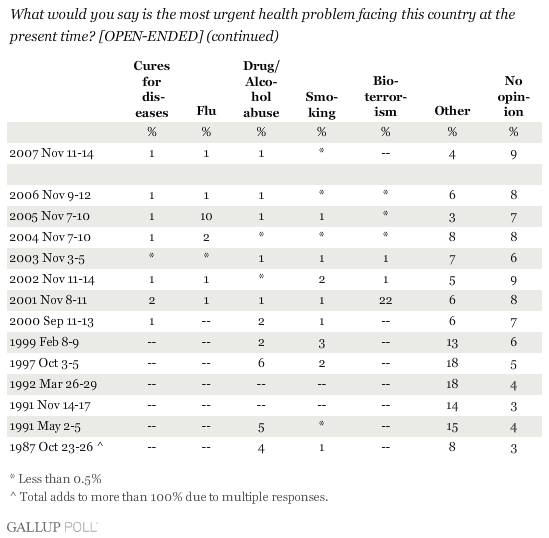PRINCETON, NJ -- Access to healthcare and healthcare costs now top Americans' perceptions of the most urgent health problem facing the country today, while the remaining third of Americans name a specific disease or ailment. This is a marked change from two decades ago when AIDS dominated Americans' thinking about the nation's health problems, and virtually no one mentioned access or costs.
”≈√€¥´√Ωfirst asked Americans to name the "most urgent health problem facing this country at the present time" in 1987, and has repeated the question annually since 1999. The latest measurement, from Gallup's Nov. 11-14, 2007, Health and Healthcare poll, finds 30% naming an issue related to healthcare access and 26% mentioning something pertaining to costs. The next-most-frequently cited issue is cancer (14%), followed by obesity (10%). AIDS and diabetes are each mentioned by 2%, while several other medical issues each register 1%.
Healthcare access and costs were also the top-rated issues on this measure a year ago; however, the percentage citing access has increased by eight points, from 22% to 30%, while mentions of cost have stayed about the same.
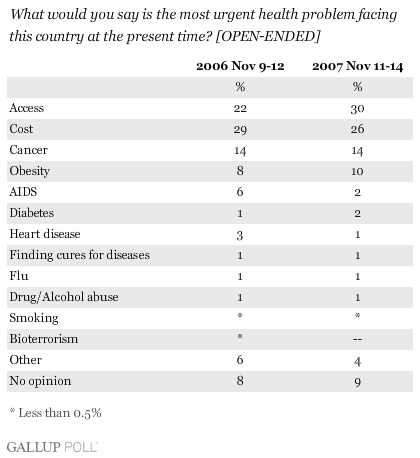
Healthcare costs surfaced as a high top-of-mind concern in late 1991 (after 1% of respondents mentioned it in 1987). This was likely because of the political attention given to healthcare in 1991, leading up to the 1992 presidential campaign. Access has emerged as a top issue only in the last five years. Even then, its appearance as a top issue has been a bit irregular. The percentage of Americans mentioning access zoomed from 8% in 2001 to 25% by 2003. It rose further to 29% in 2004, but then dropped back to 17% in 2005. Last year it rose slightly to 22%, but has now surged again, to 30%.
Mentions of healthcare costs have been quite stable by contrast. Since 2002, a consistent 25% to 29% of Americans have mentioned costs as the most urgent health problem.
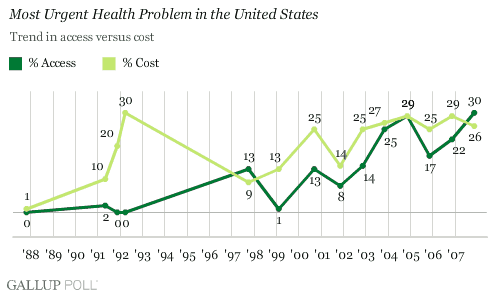
AIDS was perceived as the most urgent problem by a striking 68% of Americans in 1987. The percentage mentioning it remained fairly high through 1992, but quickly tapered off after that to less than 10%. Today's 2% is the lowest on record.
Mentions of cancer as the nation's most urgent health problem consistently fell below 20% from 1987 to 1997, then rose to the 20% level from 1999 to 2002, but have since dropped back. Since 1987, the percentage citing obesity has risen from the low single digits to the high single digits, and reached an all-time high of 10% in the current poll.
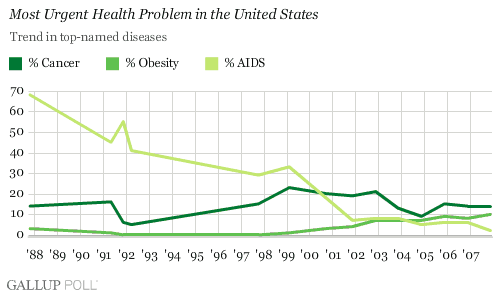
One of the biggest changes over time has been the fact that access and costs have supplanted AIDS as the top concern. As mentions of AIDS declined from 68% to 18% between 1987 and 2000, the combined percentage mentioning access and costs rose from 1% to 38%. In 2001, another issue -- bioterrorism -- competed for the public's attention. With that year's poll conducted in the midst of national concern about ongoing anthrax attacks, 22% of Americans in November 2001 mentioned bioterrorism as the most urgent health problem. Bioterrorism virtually disappeared from the list the following November, at which point mentions of healthcare access and costs rebounded, and have since increased.
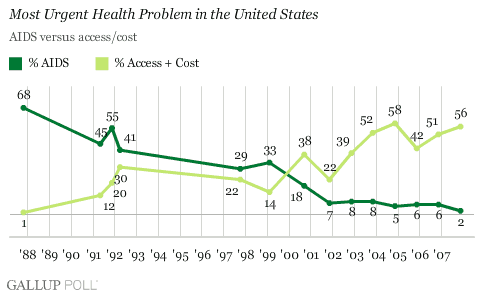
This year's increase in the percentage citing access to healthcare as the nation's most urgent health problem seems consistent with the substantial attention given to the issue in the 2008 presidential campaign, particularly on the Democratic side. However, ”≈√€¥´√Ωfinds that the increase in mentions comes mostly from political independents: 31% now mention it, up from 19% a year ago. The much smaller increases among Republicans and Democrats are not statistically significant.
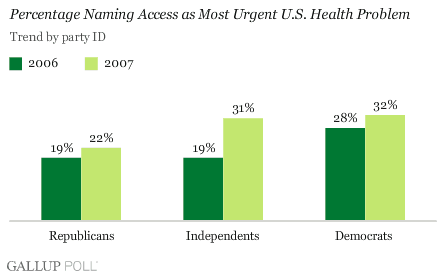
Survey Methods
Results are based on telephone interviews with 1,014 national adults, aged 18 and older, conducted Nov. 11-14, 2007. For results based on the total sample of national adults, one can say with 95% confidence that the maximum margin of sampling error is ±3 percentage points.
In addition to sampling error, question wording and practical difficulties in conducting surveys can introduce error or bias into the findings of public opinion polls.
